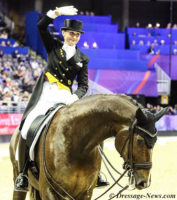No Equine Herpes Virus Infections Found in USA
4 years ago StraightArrow Comments Off on No Equine Herpes Virus Infections Found in USA

LEXINGTON, Kentucky, Mar. 2, 2021–The United States Equestrian Federation reported Tuesday that no outbreaks have been detected in the U.S. of the equine herpes virus EHV-1 that has led to immediate cancellation of horse events in 10 countries in continental Europe until Mar. 28.
The outbreak of an aggressive strain of the neurological form of EHV originated at a jumper competition in Valencia, Spain but departures of apparently infected horses spread the virus to several other countries.
“There are no current EHV-1 outbreaks related to the Valencia competition evident in the U.S. at this time,” the federation said in a statement, “but USEF is recommending members take important steps to protect their horses.
“USEF is working closely with competition organizers and veterinarians to ensure we are as prepared as possible for a potential outbreak in the U.S.”
Recommendations by the USEF to caretakers of horses:
–Review and ensure you are prepared for quick implementation of an isolation plan at a competition grounds and/or at your home farm or facility;
–Check your horse’s temperature twice daily and maintain a temperature log;
–Isolate horses at first signs of symptoms or illness and contact your vet immediately;
–Keep separate feed buckets, brushes, rags and tack/equipment for each horse;
–Ask your veterinarian about appropriate cleaning solutions;
–Eliminate communal or shared water troughs and buckets;
–Practice hand washing in between handling horses;
–Maintain social distancing for horses; limit nose to nose contact with other horses at the ring;
–Ensure your horse is vaccinated for EHV–Rhinopneumonitis vaccine. The vaccine does not protect against the neurological form of EHV, which is referred to as Equine Herpes Myeloencephalopathy (EHM) but does reduce the clinical signs and shedding of the virus.
Early identification and reporting of ill horses is critical in order to trace possible points of exposure and to aid in the prevention of further spread of the disease. The first 30 minutes following identification of a potentially infectious horse frequently determines the extent and scope of transmission and potential outbreak.
Suspected cases should be reported immediately to your veterinarian for testing if a horse begins to display any symptoms of EHV. Competition managers should also be notified if the horse is at a competition.
Horses imported into the United States undergo U.S. Department of Agriculture quarantine.

